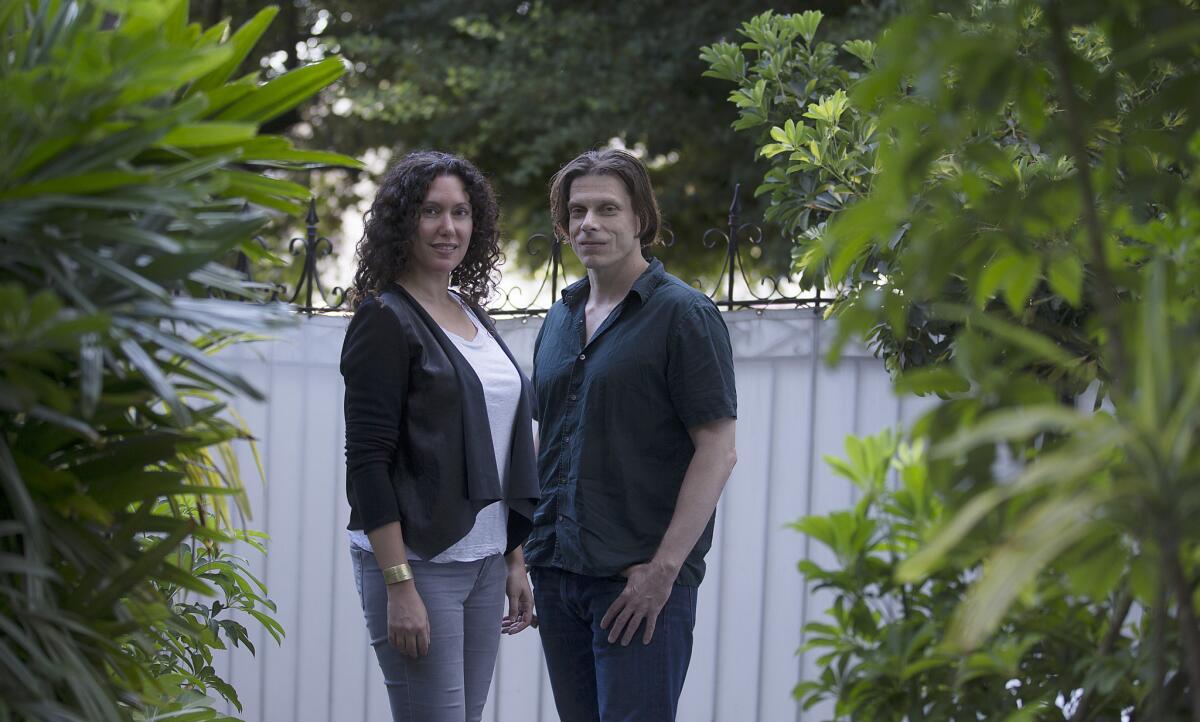Real ‘Dog Day Afternoon’ robber is focus of documentary ‘The Dog’

- Share via
A revisit to one of their favorite films, “Dog Day Afternoon,” changed the careers of documentary filmmakers Allison Berg and Frank Keraudren.
After watching the 1975 classic starring Al Pacino as a man attempting to rob a bank to pay for his lover’s sex change operation, they thought John Wojtowicz, the real-life inspiration for “Dog Day,” would make a great documentary subject.
Their hunch was correct. But they quickly realized once they began filming their documentary “The Dog,” which opens Friday, that there was no dealing with Wojtowicz in “small doses.”
“Once you were in his world you were in his world,” said Berg. “There were late-night phone calls that would go on for hours. He would want you there all the time. He would show up at one of our apartments unannounced. He even did that during a blackout.”
Wojtowicz had made headlines in 1972 when the Vietnam veteran attempted to rob a Brooklyn bank in order to get money for the sex reassignment surgery for his lover, Ernest Aron. News cameras captured what would become a 14-hour hostage situation that ended with the killing of his partner in crime, Salvatore Naturale, by the FBI.
He was sentenced to 20 years in Lewisburg Penitentiary — Wojtowicz was released early in 1978 — and Aron, who became known as Liz Eden, had her surgery in 1973. She died of AIDS-related pneumonia in Rochester, N.Y., in 1987.
Three years after the robbery attempt, “Dog Day Afternoon” was released. The Sidney Lumet directed film got six Oscar nominations and an Academy Award for Frank Pierson’s screenplay.
The filmmakers, who self-financed ‘The Dog,” initially contacted Wojto-wicz’s mother, Terry, in 2002.
“She was really sweet,” said Berg. “We said we were filmmakers who are doing some research and we want to talk to her son. He called back at 2 in the morning. We met him a few weeks later.”
Wojtowicz and his mother were living in a small Brooklyn apartment. “They were poor and always had been,” said Keraudren in a recent joint interview with Berg at the Chateau Marmont. “They were on food stamps. He wasn’t a money-driven person. He liked attention and sex, but he didn’t mind poverty.”
“It seems like his notoriety made it difficult to get a job,” added Berg. “Also, his natural state was never to follow rules. I couldn’t see him pulling off a day job for too long.”
They chronicled Wojtowicz from 2002 until he died of cancer in January 2006. His mother died six months later.
“He must have been sick when we started, but he didn’t know it,” said Berg. “He didn’t like going to the doctor. Once he got sick, it happened very quickly. We were the two people in their lives, so it was finding a very delicate balance. The film we were trying to make wasn’t about his death. There were tons of times we were in the apartment with him and his mother and we never turned the camera on.”
But when the camera was on, Wojtowicz was unfiltered, funny, unbridled and shocking. He had a gargantuan sexual appetite. “There’s sex and there’s love,” he says in the film. “I’m a lover.”
Legally married to Carmen Bifulco, with whom he had two children, until 1978, Wojtowicz claimed he was also married to Aron and George Heath, a fellow inmate who served as his jailhouse lawyer and earned Wojtowicz an early release.
Heath would spend two years living with Wojtowicz and his mother before he was sent back to prison. Though he was forbidden to visit Heath in prison, Wojtowicz disobeyed the rules and ended up serving more prison time.
“He was so open about everything,” said Keraudren. “When you are around a guy like that, it’s weirdly thrilling — in the beginning.”
But there were times when they had to step away because of his demanding personality. “He would say my mother really needs some provolone,” said Berg. “We would be like, ‘Guess what? I have a job today. I can’t make it over to Brooklyn.’”
The filmmakers knew they couldn’t stay away for long because they were the only people left to help them.
“We got involved and embedded ourselves in their lives,” said Keraudren. “ We knew things were going to get difficult, and we were not going to walk away.”
Watching Wojtowicz, who refused treatment, and his mother simultaneously become sick and die, took a toll on the filmmakers. After their deaths, they stepped away from the film for a few years.
“I am glad we went through all of that with him,” said Berg. “We made an intimate film. I think we did right by him.”
More to Read
Only good movies
Get the Indie Focus newsletter, Mark Olsen's weekly guide to the world of cinema.
You may occasionally receive promotional content from the Los Angeles Times.










